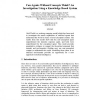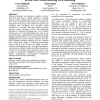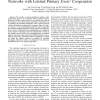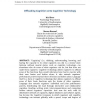1407 search results - page 5 / 282 » Cognition without content |
SGAI
2007
Springer
14 years 3 months ago
2007
Springer
Grid-World is a working computer model which has been used to investigate the search capabilities of artificial agents that understand the world in terms of non-conceptual content...
CSCW
2012
ACM
12 years 5 months ago
2012
ACM
Meeting participants can experience cognitive overload when they need both to verbally contribute to ongoing discussion while simultaneously creating notes to promote later recall...
ICC
2007
IEEE
14 years 4 months ago
2007
IEEE
— We consider a point-to-multipoint cognitive radio network that shares a set of channels with a primary network. Within the cognitive radio network, a base station (BS) controls...
CORR
2008
Springer
13 years 10 months ago
2008
Springer
: "Cognizing" (i.e., thinking, understanding, knowing, and having the capacity to do what cognizers can do) is a mental state. Systems without mental states, such as cogn...
HICSS
2003
IEEE
14 years 3 months ago
2003
IEEE
While much research has shown that ALNs can produce learning equivalent to FTF classrooms, there has been little empirical research that explicitly and rigorously explores similar...




